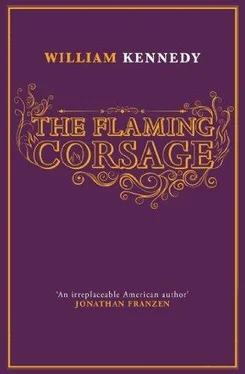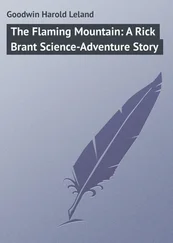“Read my inspection report on your soul in the Century .”
“What about your novel? When do we get a look at it?”
“Let’s say my novel is in abeyance,” Maginn said.
“You’ve quit it,” said Edward.
“Maybe,” said Maginn.
Excellent move, Edward thought. You never wrote a fictional paragraph I believed. More intelligent than talented, that’s your condition, Maginn.
“We all do some things better than others,” Edward said.
“I envy you your naïveté, Edward,” Maginn said. “You still think that everything you do matters. I think it’s all a chase after the great cipher.”
“Time to chase the beer,” Cadden said.
“I’ll go,” Maginn said, and he collected the drinkers’ prepaid beer tickets. When he moved toward the bar, Giles quickly unfurled his plan for the Fireman’s Wife Joke. He’d heard about it in New York, where it had had great success, but now said he needed Cadden and Edward to make it work.
“Leave me out,” Edward said. “I’m too old for this.”
“Of course you are. That’s what makes you credible.”
Edward was only five years older than Giles, but five seemed like twenty to Edward. Giles, dedicated physician, good and amiable friend, was the perennial adolescent, a fireman himself since the Delavan, reveling in the excitement of a flaming building, riding with firefighters as their doctor, treating injured firemen and burn victims.
“What do you expect me to do?” Edward asked him.
“Be the voice of authority.”
“Who else are you bringing in on it?”
“Somebody whose voice Maginn won’t recognize. Clubber Dooley, maybe. Maginn doesn’t know Clubber very well.”
“Can you trust Clubber not to give it away?” Cadden asked. “Isn’t his brain a little wrinkled?”
“Clubber’ll do me a favor,” Giles said. “I eased the pain in his bad foot last year.”
“Maginn is smart,” Edward said. “He’ll figure it out.”
“Maybe not,” Cadden said. “When he’s hot for a woman his brain moves below his belt.”
Very accurate on Maginn, Edward thought. The man, unfortunately, was a freak. He could be the greatest of friends, great talker, witty and oddly wise. Edward had had misgivings asking him to be best man at the wedding, but Maginn behaved impeccably, a notable contributor to the elevated spirits of that marvelous day. And he was embarrassingly grateful for being asked: an imprimatur on the friendship. But you are also a pain in the ass, Maginn. Your mouth is out of control and so is your critical faculty. You need come-uppance. Edward decided to help with the joke.
Maginn returned with the news that a roll of the prepaid tickets used for buying beer had been stolen, and bartenders were accepting only cash. Maginn, short of cash, suggested they all buy their own drinks. So he, Cadden, and Edward moved toward the bar at the stern of the barge.
Cully Watson and the five other toughs from the gangway incident, all in their twenties, all in shirtsleeves and caps, hovered near the bar. Only Watson was bareheaded. He had an empty glass in one hand and tickets in the other.
“You’re saying my money’s no good,” Watson said.
“Tickets are no good,” the bartender said. “Our tickets were stolen. You want a beer, you pay cash.”
“I paid cash for these tickets when I got on this shitbucket.”
“Maybe you did, but now it’s cash only.”
“He says our tickets are no good,” Watson said to his friends.
“Maybe he’s the one that’s no good,” said one.
“He says he only takes cash,” Watson said.
Edward saw the toughs were already in a fight stance, coiled with energy. Watson’s talk was a gambit. Cadden stepped up to the bar.
“I got cash money and I’d like three lagers,” Cadden said. He turned to Watson. “You guys don’t mind, do you?”
The barman filled three mugs. Watson stared at Cadden.
“This is trouble,” Maginn said. “Let it go, Cadden. We’ll go to the bar on the upper deck.”
“I got ’em already,” Cadden said, reaching for the beers.
“You wait your turn,” Watson said, and he put his tickets on the bar. “I’ll take them beers.”
“Not with tickets you won’t,” the bartender said, and he pushed the beers closer to Cadden. Watson reached for the mugs but Cadden blocked him.
“You ain’t very polite,” Watson said. He shoved Cadden with one hand and knocked him off-balance, then swept the mugs off the bar.
“Bad news, Cadden, I told you,” Maginn said. “Don’t push it.”
“Cheap hooligan,” Cadden said.
As Cadden faced down Watson, one tough picked up a fallen beer mug and stood staring at him. Suddenly the tough swung the mug and hit Cadden on the side of the head. He staggered and fell across the bar. Willie Glass and Joe Anthony arrived, swinging nightsticks. Glass rapped the tough who had floored Cadden and he buckled. Maginn and Edward pulled Cadden away from the bar and sat him on a bench. Edward felt his head. No blood. Cadden shook his head, trying to focus.
“Break this up,” Willie Glass was saying, shoving the toughs away from the bar. He and Joe Anthony had their backs to each other as they swung their clubs.
“I’ll get that son of a bitch,” Cadden said.
“Cadden,” Maginn whispered, “that’s Cully Watson. He’s a killer.”
“Where’s Giles? Get Giles to come and look at Cadden’s head,” Edward said to Maginn.
Two toughs leaped on Glass, took away his stick, and brought him down. Two other toughs were showing knives, and one said, “The cop says break it up, so we’ll break it up,” and he kicked Glass in the mouth, then bashed his face with a beer mug. Anthony clubbed the kicker, but another tough hit Anthony with a mug and blood spurted from his left eye.
Two fell on Glass, punching his face, which was drenched in blood. One tough took his revolver and two others pulled off his uniform jacket, then his pants and shoes. Jack McCall moved out of the crowd and next to Edward, a club in his hand.
“Let’s move in,” Jack said.
“Gimme his gun,” Cully Watson said, and a tough threw Glass’s gun to Cully, who fired it into the deck, halting Jack and Edward’s forward motion. Another tough took Anthony’s pistol and pulled his uniform off. With their knives the toughs sliced the uniforms into rags. Cully, pistol in hand, shoved aside the two elderly bartenders, and with his other hand held a mug under the open tap. One tough pointed Anthony’s pistol at the crowd of picnickers, keeping reinforcements at bay. Men from the excursion sent women and children to the upper deck.
Cully drew more beers and slid them across the bar to the toughs, who guzzled it. Cully left the taps open, the deck awash in beer, then tucked the pistol in his belt, picked up an empty keg, and tossed it over the bar to a tough, who caught it.
“Give Glass some beer,” Cully said, and the tough dropped the beer keg on Willie Glass’s back. Glass was unconscious, clad only in underwear, his and Anthony’s uniforms in shreds. Anthony was conscious, but bleeding profusely.
“Take a uniform away from a cop,” Cully said, “you can’t tell he’s a cop no more.”
Edward saw Francis moving up behind the tough who held the pistol, and he decided to act.
“You goddamn pack of jackals,” Edward yelled, and he threw a beer mug at the tough with the gun and hit his chin. The man fired once and hit a stranger next to Edward. Francis came up behind the tough and pinioned him with a life preserver, then kneed him in the crotch and kicked the gun toward Edward. Cully fired a second shot into the deck before Edward could pick up the pistol. Another tough rushed to pick it up, but Cadden, with the energy of rage, stood and grabbed the attacker’s arm, smashed his nose with his fist. Cadden snapped the man’s arm like an ear of corn, dragged him to the railing.
Читать дальше












